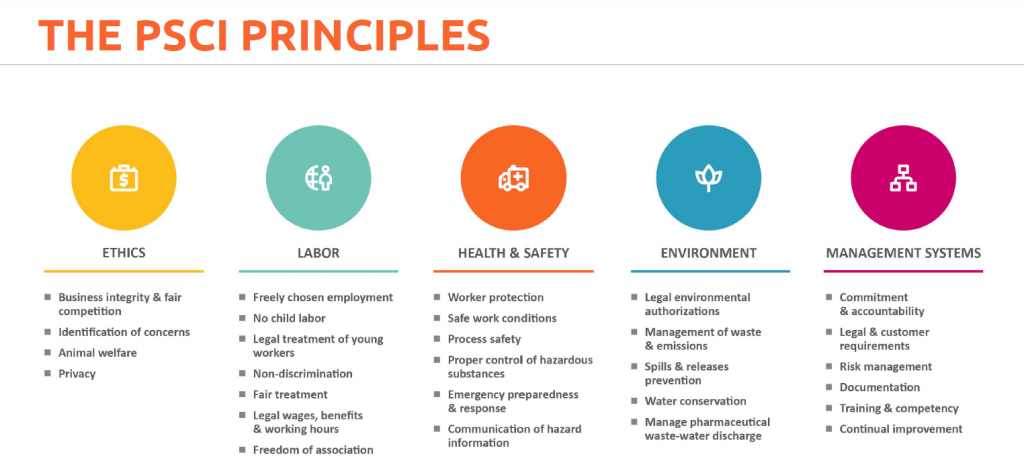Due to increasing requirements in the pharmaceutical industry, DFGE introduces the PSCI and especially its established pharmaceutical industry principles for responsible supply chain management in the following.
What is the PSCI?
The Pharmaceutical Supply Chain Initiative (PSCI) is an initiative formed as a non-profit business membership in 2006, which is addressing challenges, such as supply chain issues, bonded labor, pollution, bribery and corruption. Its vision is to establish and promote responsible practices that will continuously improve ethics, labor, health, safety and environmentally sustainable outcomes in the pharmaceutical supply chains. The PSCI experienced an increase from 19 members to 40 members in the last 5 years. There are two types of memberships. There is a “Full Membership”, which is designed for companies that wish to actively participate and demonstrate leadership and an “Associate Membership”, which allows companies to take a less active role. The latter is for companies that are just starting their responsible sourcing programs or that do not have the time to participate fully. All members accept and share the PSCI vision, but most importantly they are committed to continuous improvement in the supply chain.
What does the PSCI do?
Besides being a common voice for the pharmaceutical industry, the PSCI arranged to create pharmaceutical industry principles for responsible supply chain management. These principles address the five areas of business practices: ethics, labor, health & safety, environment and management systems, and demonstrate what the industry expects from the supply chain. In order to sustain and improve the principles, the PSCI performs audits and promotes audit sharing.
In order to build supplier capability, the PSCI provides conferences, webinars and a resource library for suppliers. In 2018 for example, 210 supplier delegates attended a two-day supplier conference in Shanghai.
The PSCI principles
The pharmaceutical industry principles for responsible supply chain management articulate broad descriptions of what is expected from the suppliers. As mentioned before these principles address 5 topics of business practices in different ways:
- Ethics:
Suppliers shall conduct their business in an ethical manner and act with integrity.
- Labor:
Suppliers shall be committed to uphold the human rights of their workers and to treat them with respect and dignity.
- Health & Safety:
Suppliers shall provide a safe and healthy working environment, that includes any company-provided living quarters.
- Environment:
Suppliers shall operate in an environmentally responsible and efficient manner to minimize adverse impacts on the environment. Suppliers are encouraged to conserve natural resources, to avoid the use of hazardous materials where possible and to engage in activities that reuse and recycle.
- Management systems:
Suppliers shall use management systems to facilitate continual improvement and compliance with the expectations of these principals.
Furthermore, the PSCI provides a guidance for the implementation of the principles. This document includes examples of business practices and performance related to the principles.

Figure 1: The principles (Source: PSCI Overview Presentation)
Support by DFGE
The DFGE has been supporting companies in their sustainability efforts since 1999 and has extensive expertise in CSR reporting and accounting. We support your participation in international initiatives such as UN Global Compact, CDP Climate Change, CDP Supply Chain, CDP Water and EcoVadis. For example, one of our customers, Optima Pharmazeutische GmbH is a middle-class pharmaceutical company from Bavaria. Since 2013, we provide the Corporate Carbon Footprint for Optima, as well as the UN Global Compact since 2014. If you have any questions about this or any other requests, please contact us via or by phone on 08192-99733-20.
Sources: PSCI Overview Presentation: https://pscinitiative.org/resource?resource=313 (retrieved 18.09.2019)









